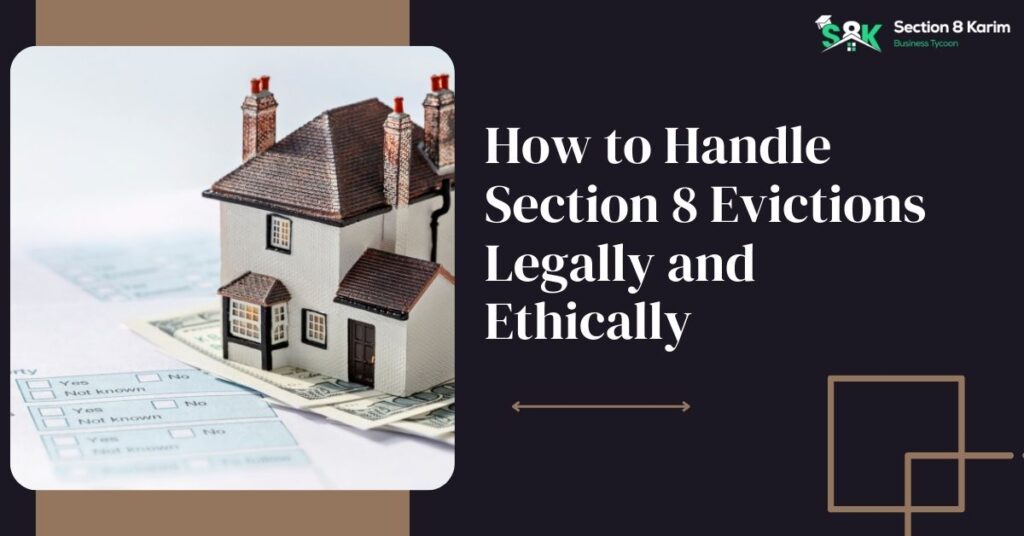Evicting a tenant under the Section 8 Housing Choice Voucher Program is a complex process that requires adherence to federal, state, and local laws. While eviction is sometimes necessary due to lease violations, landlords must approach the process legally and ethically to protect tenant rights and minimize conflicts.
This guide outlines the legal framework, best practices, and ethical considerations for handling Section 8 evictions in a fair and compliant manner.
Understanding the Legal Framework for Section 8 Evictions
Know the Grounds for Eviction
Under Section 8, landlords must have justifiable grounds for eviction. Common reasons include:
- Nonpayment of rent. Although a portion of rent is covered by the housing authority, tenants must pay their share.
- Lease violations such as unauthorized occupants, property damage, or engaging in illegal activities.
- Failure to maintain eligibility due to increased income or policy violations.
- Refusal to renew the lease when proper notice has been given.
Each state and locality has specific rules governing Section 8 evictions, so landlords should consult an attorney or local housing authority for guidance.
Follow Proper Notice Procedures
Landlords cannot evict a Section 8 tenant without proper notice. The process typically includes:
- Pay or quit notice given for nonpayment of rent, allowing the tenant time to pay or vacate.
- Cure or quit notice issued for lease violations, providing an opportunity to correct the issue.
- Unconditional quit notice used for severe violations like illegal activities or repeated offenses.
The required notice period varies by jurisdiction but typically ranges from 30 to 90 days.
Obtain Court Approval for Eviction
Unlike private rental evictions, Section 8 landlords must go through the formal court eviction process:
- File an eviction lawsuit (unlawful detainer case) where a court summons is issued to the tenant.
- The tenant has the right to defend their case in court.
- If the court rules in favor of the landlord, an official eviction order is issued.
- If necessary, a sheriff can remove the tenant after the legal process concludes.
Skipping legal procedures can lead to lawsuits, fines, or a forced reversal of the eviction.
Ethical Considerations in Section 8 Evictions
Prioritize Communication and Conflict Resolution
Before moving forward with eviction, attempt to resolve issues through:
- Direct communication to discuss concerns with the tenant and find mutual solutions.
- Payment plans if the issue is nonpayment, offering a short-term payment arrangement.
- Warning letters before pursuing eviction to allow tenants to correct violations.
Many tenants facing eviction are experiencing financial hardships or personal crises. Approaching them with empathy and flexibility can prevent unnecessary evictions.
Work with Housing Authorities
Section 8 landlords should inform the local Public Housing Authority (PHA) of any eviction proceedings. Some PHAs offer mediation services or financial assistance programs to help tenants stay in their homes.
Working collaboratively with housing authorities can lead to solutions that avoid eviction while maintaining compliance.
Offer Relocation Assistance
If eviction is unavoidable, consider providing tenants with:
- Resource lists with information on local shelters, rental assistance programs, and legal aid services.
- Extended move-out periods to allow additional time for tenants to secure alternative housing.
- Security deposit returns, if applicable, to assist with relocation costs.
Assisting with relocation demonstrates good faith and ethical responsibility, reducing the likelihood of legal disputes.
Best Practices for a Smooth and Legal Section 8 Eviction
Maintain Detailed Records
Keeping thorough documentation protects landlords in legal proceedings. Maintain records of:
- Lease agreements and amendments
- Payment history and late notices
- Written warnings and communication logs
- Photos of property damage or lease violations
- Copies of legal notices served
Avoid Retaliatory or Discriminatory Evictions
Landlords cannot evict a tenant in response to:
- Complaints about maintenance or repairs
- Reporting discrimination or safety violations
- Exercising tenant rights under fair housing laws
Federal law protects Section 8 tenants from discrimination based on race, disability, family status, and other protected characteristics.
Follow the Law to Prevent Legal Consequences
Unlawful eviction actions, such as changing locks, shutting off utilities, or removing tenant belongings without a court order, can lead to:
- Civil penalties
- Criminal charges
- Lawsuits for damages
Always rely on legal eviction procedures to avoid severe repercussions.
Final Thoughts
Handling a Section 8 eviction requires a balance of legal compliance and ethical responsibility. By following proper eviction procedures, engaging in open communication, and working with housing authorities, landlords can ensure a fair, lawful, and minimally disruptive eviction process.
FAQs:
What are the common grounds for evicting a Section 8 tenant?
Section 8 tenants can be evicted for nonpayment of rent, lease violations (such as unauthorized occupants or property damage), failure to maintain eligibility, or refusal to renew the lease.
Why is it important to follow legal procedures when evicting a Section 8 tenant?
Legal procedures ensure compliance with housing laws, prevent lawsuits, and protect landlords from penalties, such as fines or a forced reversal of the eviction.
How can landlords handle Section 8 evictions ethically?
Landlords can prioritize communication, offer payment plans, work with housing authorities, and provide relocation assistance to minimize disruption for tenants.

